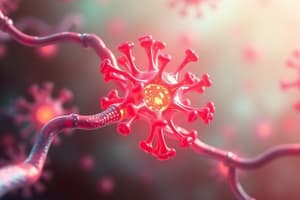Podcast
Questions and Answers
Which G-protein is primarily associated with H2 receptor activation?
Which G-protein is primarily associated with H2 receptor activation?
- Gi protein
- Gq protein
- G12/13 protein
- Gs protein (correct)
What is the main pharmacological action of H3 receptor activation?
What is the main pharmacological action of H3 receptor activation?
- Vasodilation
- Smooth muscle contraction
- Decreased histamine release from neurons (correct)
- Increased capillary permeability
Which receptor stimulation is primarily responsible for the Triple Response to histamine?
Which receptor stimulation is primarily responsible for the Triple Response to histamine?
- H4 receptor
- H1 receptor (correct)
- H2 receptor
- H3 receptor
What is necessary for an allergic reaction to occur according to the text?
What is necessary for an allergic reaction to occur according to the text?
What is the initial immune system response to an allergen?
What is the initial immune system response to an allergen?
What is the role of mast cells and basophils in allergic reactions?
What is the role of mast cells and basophils in allergic reactions?
Which antihistamine group can cross the blood-brain barrier, causing sedation?
Which antihistamine group can cross the blood-brain barrier, causing sedation?
What is the mechanism of non-sedating antihistamines?
What is the mechanism of non-sedating antihistamines?
What are the therapeutic uses of sedating antihistamines?
What are the therapeutic uses of sedating antihistamines?
What are the therapeutic uses of non-sedating antihistamines?
What are the therapeutic uses of non-sedating antihistamines?
What is the characteristic of sensitization in allergic individuals?
What is the characteristic of sensitization in allergic individuals?
What triggers the release of histamine and other mediators in allergic reactions?
What triggers the release of histamine and other mediators in allergic reactions?
Flashcards are hidden until you start studying
Study Notes
G-Protein and Receptors
- H2 receptor activation is primarily associated with the Gs protein, which stimulates adenylate cyclase and increases intracellular cAMP levels.
- Stimulation of H3 receptors mainly inhibits neurotransmitter release, influencing sedation and pain perception.
Histamine Reactions
- The Triple Response to histamine, characterized by redness, swelling, and wheal formation, is primarily mediated by H1 receptor stimulation.
- For an allergic reaction to occur, there must be prior sensitization to an allergen, involving the generation of specific antibodies.
Immune System Response
- The initial immune response to an allergen involves the activation of B cells, which produce IgE antibodies, sensitizing the individual to future exposures.
- Mast cells and basophils play a crucial role in allergic reactions; they release histamine and other mediators upon re-exposure to the allergen.
Antihistamines
- Sedating antihistamines, such as diphenhydramine, can cross the blood-brain barrier, leading to sedative effects.
- Non-sedating antihistamines, like cetirizine, primarily exert their effects on peripheral H1 receptors, minimizing central nervous system penetration and sedation.
Therapeutic Uses
- Sedating antihistamines are utilized for treating insomnia, anxiety, and allergic symptoms due to their sedative properties.
- Non-sedating antihistamines are mainly used to manage allergic rhinitis, chronic urticaria, and other allergy-related conditions without significant sedation.
Allergic Sensitization
- Individuals with allergies exhibit sensitization characterized by the production of IgE antibodies against specific allergens, leading to heightened reactions upon subsequent exposures.
Histamine Release Triggers
- The release of histamine and other mediators in allergic reactions is triggered by cross-linking of IgE antibodies on the surface of mast cells and basophils upon exposure to the respective allergen.
Studying That Suits You
Use AI to generate personalized quizzes and flashcards to suit your learning preferences.




